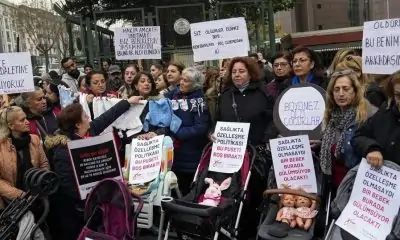Here’s your daily update with everything you need to know on the novel coronavirus situation in B.C. for May 16, 2020.
Health
COVID-19 update for May 16: Here's the latest on coronavirus in B.C. – The Kingston Whig-Standard

Here’s your daily update with everything you need to know on the novel coronavirus situation in B.C. for May 16, 2020.
Here’s your daily update with everything you need to know on the novel coronavirus situation in B.C. for May 16, 2020.
We’ll provide summaries of what’s going on in B.C. right here so you can get the latest news at a glance. This page will be updated regularly throughout the day, with developments added as they happen.
Check back here for more updates throughout the day.
CASE SUMMARY
As of the latest numbers on May 16:
• Total confirmed cases in B.C.: 2,428 (355 active cases)
• New cases since May 14, 2020: 21
• Hospitalized cases: 49
• Intensive care: 11
• COVID-19 related deaths: 141
• Recovered: 1,932
• Long-term care and assisted-living homes currently affected: 15
• Acute care facilities currently affected: 5
The next update is on Monday.
IN-DEPTH: COVID-19: Here are all the B.C. cases of the novel coronavirus
GUIDES AND LINKS
• COVID-19: Here’s everything you need to know about the novel coronavirus
• COVID-19: Vancouver-area events postponed or cancelled because of spreading virus
• COVID-19: What’s open and closed in Metro Vancouver due to coronavirus
• B.C. COVID-19 Symptom Self-Assessment Tool
LATEST UPDATES
1 p.m. – B.C. records 21 new cases, one additional death
Provincial health officer Dr. Bonnie Henry said Saturday that B.C. has 21 new confirmed cases of COVID-19, boosting the total to 2,428 cases.
Henry said there has been one more death from COVID-19 complications, increasing the grim total of B.C. deaths to 141.
9 a.m. – Health Canada approves clinic trial for potential vaccine
Prime Minister Justin Trudeau says Health Canada has authorized the first clinical trial for a potential COVID-19 vaccine at Dalhousie University in Nova Scotia.
Trudeau also says an additional $100 million will go to the Red Cross to help deal with COVID-19, floods and wildfires.
9 a.m. – Trudeau hopes government can help Air Canada following announcement of layoffs
Prime Minister Justin Trudeau says the government will work closely with Air Canada to see if any more help can be offered after the airline announced mass layoffs yesterday.
Trudeau acknowledges it’s a very difficult situation for airlines and the travel industry during the COVID-19 crisis.
Air Canada will lay off more than half of its 38,000 employees next month as it grapples with the fallout from the COVID-19 pandemic. The airline estimates about 20,000 of its employees will be affected.
Air Canada’s move was announced after Trudeau extended the $73-billion Canada Emergency Wage Subsidy through the end of August earlier Friday.
Trudeau said the government will continue to work with Air Canada to try to determine the best way to get through the crisis.
9 a.m. – Snowbirds fly into B.C. on Saturday
The Snowbirds, the Canadian Forces’ famed precision flying team, will buzz into British Columbia today with Operation INSPIRATION, a cross-Canada salute front-line health-care workers, first responders, and essential workers.
The squadron, which performed flyovers in Alberta on Friday and took out of Edmonton morning, will take off from Rocky Mountain House around 12:30 p.m. and zoom over Revelstoke, Sicamous and Salmon Arm before landing in Kamloops at 1:30 p.m.
The team’s signature nine-jet formation, with trailing white smoke, has been flying over cities across the country starting in Nova Scotia last weekend
The remainder of the Snowbirds’ B.C. schedule has not been released.
8 a.m. – The latest numbers on COVID-19 in Canada
There are 75,004 confirmed and presumptive cases in Canada.
• Quebec: 41,420 confirmed (including 3,401 deaths, 11,039 resolved)
• Ontario: 22,313 confirmed (including 1,858 deaths, 17,020 resolved)
• Alberta: 6,515 confirmed (including 125 deaths, 5,317 resolved)
• British Columbia: 2,407 confirmed (including 140 deaths, 1,908 resolved)
• Nova Scotia: 1,034 confirmed (including 55 deaths, 918 resolved)
• Saskatchewan: 590 confirmed (including 6 deaths, 408 resolved)
• Manitoba: 278 confirmed (including 7 deaths, 254 resolved), 11 presumptive)
• Newfoundland and Labrador: 260 confirmed (including 3 deaths, 248 resolved)
• New Brunswick: 120 confirmed (including 118 resolved)
• Prince Edward Island: 27 confirmed (including 27 resolved)
• Repatriated Canadians: 13 confirmed (including 13 resolved)
• Yukon: 11 confirmed (including 11 resolved)
• Northwest Territories: 5 confirmed (including 5 resolved)
• Nunavut: No confirmed cases
Total: 75,004 (11 presumptive, 74,993 confirmed including 5,595 deaths, 37,286 resolved)
12 a.m. – Hollywood North poised to hit the ground running
Once the government gives the film and TV industry the green light to reopen in B.C. productions will be hitting the ground running, says Vancouver’s Brightlight Pictures chairman Shawn Williamson.
“As fast as we shut down we will be able to start up once we find the safe protocols,” said Williamson, whose company produces the TV shows The Good Doctor, The Power and The Mighty Ducks as well as numerous Hallmark movies.
“Film will come back very quickly.”
Brightlight’s productions were part of the 42 shows and films that were shut down because of the COVID-19 pandemic in the second week of March.
According to Creative B.C., the provincial agency that supports B.C.’s creative sector, TV and film production contributes close to $3 billion a year to the province’s economy, with around 70,000 jobs directly linked to the industry.
On May 6, Premier John Horgan announced the B.C.’s four-phase restart plan. The film and TV industry falls under phase 3, which is expected to happen June to September if COVID transmission rates remain low or decline and government protocols are met.
Creative B.C., film and TV industry representatives, unions, and WorkSafeBC are working to develop those protocols.
Today, we introduce you to some unsung COVID-19 heroes, who have proudly continued to perform their jobs during this pandemic, despite earning below B.C.’s average hourly wage. And we visit some organizations helping to feed, house and protect these important citizens, and who are lobbying for change.
Read the story from reporter Lori Culbert HERE
LOCAL RESOURCES
Here are a number of information and landing pages for COVID-19 from various health and government agencies.
• B.C. COVID-19 Symptom Self-Assessment Tool
• Vancouver Coastal Health – Information on Coronavirus Disease (COVID-19)
• HealthLink B.C. – Coronavirus (COVID-19) information page
• B.C. Centre for Disease Control – Novel coronavirus (COVID-19)
• Government of Canada – Coronavirus disease (COVID-19): Outbreak update
• World Health Organization – Coronavirus disease (COVID-19) outbreak
Health
What’s the greatest holiday gift: lips, hair, skin? Give the gift of great skin this holiday season

|
Give the gift of great skin this holiday season Skinstitut Holiday Gift Kits take the stress out of gifting Toronto, October 31, 2024 – Beauty gifts are at the top of holiday wish lists this year, and Laser Clinics Canada, a leader in advanced beauty treatments and skincare, is taking the pressure out of seasonal shopping. Today, Laser Clincs Canada announces the arrival of its 2024 Holiday Gift Kits, courtesy of Skinstitut, the exclusive skincare line of Laser Clinics Group. In time for the busy shopping season, the limited-edition Holiday Gifts Kits are available in Laser Clinics locations in the GTA and Ottawa. Clinics are conveniently located in popular shopping centers, including Hillcrest Mall, Square One, CF Sherway Gardens, Scarborough Town Centre, Rideau Centre, Union Station and CF Markville. These limited-edition Kits are available on a first come, first served basis. “These kits combine our best-selling products, bundled to address the most relevant skin concerns we’re seeing among our clients,” says Christina Ho, Senior Brand & LAM Manager at Laser Clinics Canada. “With several price points available, the kits offer excellent value and suit a variety of gift-giving needs, from those new to cosmeceuticals to those looking to level up their skincare routine. What’s more, these kits are priced with a savings of up to 33 per cent so gift givers can save during the holiday season. There are two kits to select from, each designed to address key skin concerns and each with a unique theme — Brightening Basics and Hydration Heroes. Brightening Basics is a mix of everyday essentials for glowing skin for all skin types. The bundle comes in a sleek pink, reusable case and includes three full-sized products: 200ml gentle cleanser, 50ml Moisture Defence (normal skin) and 30ml1% Hyaluronic Complex Serum. The Brightening Basics kit is available at $129, a saving of 33 per cent. Hydration Heroes is a mix of hydration essentials and active heroes that cater to a wide variety of clients. A perfect stocking stuffer, this bundle includes four deluxe products: Moisture 15 15 ml Defence for normal skin, 10 ml 1% Hyaluronic Complex Serum, 10 ml Retinol Serum and 50 ml Expert Squalane Cleansing Oil. The kit retails at $59. In addition to the 2024 Holiday Gifts Kits, gift givers can easily add a Laser Clinic Canada gift card to the mix. Offering flexibility, recipients can choose from a wide range of treatments offered by Laser Clinics Canada, or they can expand their collection of exclusive Skinstitut products.
|
||
|
Brightening Basics 2024 Holiday Gift Kit by Skinstitut, available exclusively at Laser Clincs Canada clinics and online at skinstitut.ca. |
||
|
Hydration Heroes 2024 Holiday Gift Kit by Skinstitut – available exclusively at Laser Clincs Canada clinics and online at skinstitut.ca. |
Health
Here is how to prepare your online accounts for when you die

LONDON (AP) — Most people have accumulated a pile of data — selfies, emails, videos and more — on their social media and digital accounts over their lifetimes. What happens to it when we die?
It’s wise to draft a will spelling out who inherits your physical assets after you’re gone, but don’t forget to take care of your digital estate too. Friends and family might treasure files and posts you’ve left behind, but they could get lost in digital purgatory after you pass away unless you take some simple steps.
Here’s how you can prepare your digital life for your survivors:
Apple
The iPhone maker lets you nominate a “ legacy contact ” who can access your Apple account’s data after you die. The company says it’s a secure way to give trusted people access to photos, files and messages. To set it up you’ll need an Apple device with a fairly recent operating system — iPhones and iPads need iOS or iPadOS 15.2 and MacBooks needs macOS Monterey 12.1.
For iPhones, go to settings, tap Sign-in & Security and then Legacy Contact. You can name one or more people, and they don’t need an Apple ID or device.
You’ll have to share an access key with your contact. It can be a digital version sent electronically, or you can print a copy or save it as a screenshot or PDF.
Take note that there are some types of files you won’t be able to pass on — including digital rights-protected music, movies and passwords stored in Apple’s password manager. Legacy contacts can only access a deceased user’s account for three years before Apple deletes the account.
Google takes a different approach with its Inactive Account Manager, which allows you to share your data with someone if it notices that you’ve stopped using your account.
When setting it up, you need to decide how long Google should wait — from three to 18 months — before considering your account inactive. Once that time is up, Google can notify up to 10 people.
You can write a message informing them you’ve stopped using the account, and, optionally, include a link to download your data. You can choose what types of data they can access — including emails, photos, calendar entries and YouTube videos.
There’s also an option to automatically delete your account after three months of inactivity, so your contacts will have to download any data before that deadline.
Facebook and Instagram
Some social media platforms can preserve accounts for people who have died so that friends and family can honor their memories.
When users of Facebook or Instagram die, parent company Meta says it can memorialize the account if it gets a “valid request” from a friend or family member. Requests can be submitted through an online form.
The social media company strongly recommends Facebook users add a legacy contact to look after their memorial accounts. Legacy contacts can do things like respond to new friend requests and update pinned posts, but they can’t read private messages or remove or alter previous posts. You can only choose one person, who also has to have a Facebook account.
You can also ask Facebook or Instagram to delete a deceased user’s account if you’re a close family member or an executor. You’ll need to send in documents like a death certificate.
TikTok
The video-sharing platform says that if a user has died, people can submit a request to memorialize the account through the settings menu. Go to the Report a Problem section, then Account and profile, then Manage account, where you can report a deceased user.
Once an account has been memorialized, it will be labeled “Remembering.” No one will be able to log into the account, which prevents anyone from editing the profile or using the account to post new content or send messages.
X
It’s not possible to nominate a legacy contact on Elon Musk’s social media site. But family members or an authorized person can submit a request to deactivate a deceased user’s account.
Passwords
Besides the major online services, you’ll probably have dozens if not hundreds of other digital accounts that your survivors might need to access. You could just write all your login credentials down in a notebook and put it somewhere safe. But making a physical copy presents its own vulnerabilities. What if you lose track of it? What if someone finds it?
Instead, consider a password manager that has an emergency access feature. Password managers are digital vaults that you can use to store all your credentials. Some, like Keeper,Bitwarden and NordPass, allow users to nominate one or more trusted contacts who can access their keys in case of an emergency such as a death.
But there are a few catches: Those contacts also need to use the same password manager and you might have to pay for the service.
___
Is there a tech challenge you need help figuring out? Write to us at onetechtip@ap.org with your questions.
Health
Pediatric group says doctors should regularly screen kids for reading difficulties

The Canadian Paediatric Society says doctors should regularly screen children for reading difficulties and dyslexia, calling low literacy a “serious public health concern” that can increase the risk of other problems including anxiety, low self-esteem and behavioural issues, with lifelong consequences.
New guidance issued Wednesday says family doctors, nurses, pediatricians and other medical professionals who care for school-aged kids are in a unique position to help struggling readers access educational and specialty supports, noting that identifying problems early couldhelp kids sooner — when it’s more effective — as well as reveal other possible learning or developmental issues.
The 10 recommendations include regular screening for kids aged four to seven, especially if they belong to groups at higher risk of low literacy, including newcomers to Canada, racialized Canadians and Indigenous Peoples. The society says this can be done in a two-to-three-minute office-based assessment.
Other tips encourage doctors to look for conditions often seen among poor readers such as attention-deficit hyperactivity disorder; to advocate for early literacy training for pediatric and family medicine residents; to liaise with schools on behalf of families seeking help; and to push provincial and territorial education ministries to integrate evidence-based phonics instruction into curriculums, starting in kindergarten.
Dr. Scott McLeod, one of the authors and chair of the society’s mental health and developmental disabilities committee, said a key goal is to catch kids who may be falling through the cracks and to better connect families to resources, including quicker targeted help from schools.
“Collaboration in this area is so key because we need to move away from the silos of: everything educational must exist within the educational portfolio,” McLeod said in an interview from Calgary, where he is a developmental pediatrician at Alberta Children’s Hospital.
“Reading, yes, it’s education, but it’s also health because we know that literacy impacts health. So I think that a statement like this opens the window to say: Yes, parents can come to their health-care provider to get advice, get recommendations, hopefully start a collaboration with school teachers.”
McLeod noted that pediatricians already look for signs of low literacy in young children by way of a commonly used tool known as the Rourke Baby Record, which offers a checklist of key topics, such as nutrition and developmental benchmarks, to cover in a well-child appointment.
But he said questions about reading could be “a standing item” in checkups and he hoped the society’s statement to medical professionals who care for children “enhances their confidence in being a strong advocate for the child” while spurring partnerships with others involved in a child’s life such as teachers and psychologists.
The guidance said pediatricians also play a key role in detecting and monitoring conditions that often coexist with difficulty reading such as attention-deficit hyperactivity disorder, but McLeod noted that getting such specific diagnoses typically involves a referral to a specialist, during which time a child continues to struggle.
He also acknowledged that some schools can be slow to act without a specific diagnosis from a specialist, and even then a child may end up on a wait list for school interventions.
“Evidence-based reading instruction shouldn’t have to wait for some of that access to specialized assessments to occur,” he said.
“My hope is that (by) having an existing statement or document written by the Canadian Paediatric Society … we’re able to skip a few steps or have some of the early interventions present,” he said.
McLeod added that obtaining specific assessments from medical specialists is “definitely beneficial and advantageous” to know where a child is at, “but having that sort of clear, thorough assessment shouldn’t be a barrier to intervention starting.”
McLeod said the society was partly spurred to act by 2022’s “Right to Read Inquiry Report” from the Ontario Human Rights Commission, which made 157 recommendations to address inequities related to reading instruction in that province.
He called the new guidelines “a big reminder” to pediatric providers, family doctors, school teachers and psychologists of the importance of literacy.
“Early identification of reading difficulty can truly change the trajectory of a child’s life.”
This report by The Canadian Press was first published Oct. 23, 2024.
-

 News18 hours ago
News18 hours agoTrial to begin in human smuggling case after freezing deaths of Indian family at Canada-US border
-

 News7 hours ago
News7 hours agoHealth workers go on trial in Turkey accused of private care scheme linked to 10 infant deaths
-

 News18 hours ago
News18 hours agoWisconsin Supreme Court hearing case targeting swing state’s top elections administrator
-

 News7 hours ago
News7 hours ago6 monkeys are still on the loose from a South Carolina compound after dozens escaped
-

 News7 hours ago
News7 hours agoA look at Rafael Nadal’s 22 Grand Slam titles as he prepares to retire after the Davis Cup
-

 Business9 hours ago
Business9 hours agoJob Seekers’ Trinity Focus, Anger and Evidence
-

 Business8 hours ago
Business8 hours agoWhich Candidate Would You Hire? A or B?
-

 News5 hours ago
News5 hours agoTrudeau talks root causes of hunger at G20, will meet with Biden, other leaders






















